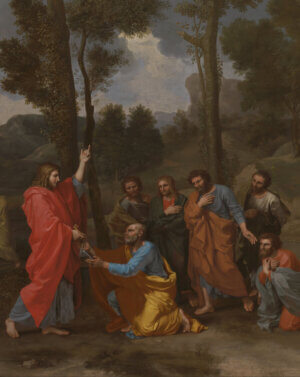
“A Glimpse of Heaven”
Father Peter Fitzgibbons
February 24 – 25, 2024
Gospel: Mark 9:2-10
2) After six days Jesus took Peter, James, and John and led them up a high mountain apart by themselves. And He was transfigured before them, 3) and His clothes became dazzling white, such as no fuller on earth could bleach them. 4) Then Elijah appeared to them along with Moses, and they were conversing with Jesus. 5) Then Peter said to Jesus in reply, “Rabbi, it is good that we are here! Let us make three tents: one for You, one for Moses, and one for Elijah.” 6) He hardly knew what to say, they were so terrified. 7) Then a cloud came, casting a shadow over them; then from the cloud came a voice, “This is my beloved Son. Listen to Him.” 8) Suddenly, looking around, they no longer saw anyone but Jesus alone with them. 9) As they were coming down from the mountain, He charged them not to relate what they had seen to anyone, except when the Son of Man had risen from the dead. 10) So, they kept the matter to themselves, questioning what rising from the dead meant.
We learn what Heaven is like by the transfigurations in the Gospel. I could preach for hours on that subject. Would you like me to preach for hours? Before you respond, the pious answer is “Yes, Father.” But I know what you are really thinking: “Come on old man. I’m starving here!” So, what is Heaven like? Heaven is being in the presence of Jesus. It’s not a place. It’s a Who. It is the presence of God. Moses and Elijah were in the presence of God. They talked about what would happen in the future, so they had knowledge of the future. Remember that in Heaven everything is in the present. God is always in the present because He is not subject to His own creation of time, the past, or the future. Everything is present to God at once. All time is present.
How did the Apostles know they were talking to Moses and Elijah? There was no Facebook back then. There were no cameras or photographs. So, like Moses and Elijah, their minds had been enlightened by a gift from God. They knew Moses and Elijah. They knew they were talking to Jesus. So, what does that tell us about death? It tells us there is forgiveness after death. What did God say to Moses after he struck the rock three times? “Because you did not believe in me. . . therefore you shall not bring this assembly into the land which I have given them” (Num. 20:6-13). Moses was not allowed to enter the Promised Land, but where was he that day? He was in the Promised Land. So, there is forgiveness after death.
Purgatory is the full expression of God’s love and mercy. The Apostles wanted this joy to continue; however, Heaven is later and not here on Earth no matter what any bishop or Church deacon tells you. “If we have just one more collection or one more ministry, we’ll have Heaven on Earth, and everybody will be happy.” No. We will never have Heaven on Earth. That’s akin to a government official saying, “If we pass these great budgets and everything else, we’ll be all set, and everybody will be happy.” Ahh, no. You won’t have Heaven on Earth. Heaven comes later. If we are holy, we will have as much happiness as possible in this life. However, full happiness does not come until we are with our Savior forever.
Holiness has its own crosses. Bishop Sheen had a television show. He was a handsome man, eloquent, learned, and gave a great presentation. Do you know what his daily diet consisted of? Boiled chicken, graham crackers, and milk. His stomach was that bad, but nobody knew. Saint Theresa of Calcutta experienced “interior darkness,” but she was joyous. Never mind all the crosses Saint John Paul II had as the Holy Father, but he was also shot. Doctors say that the blood transfusions he received caused his Parkinson’s disease. However, he suffered joyously for the salvation of souls. One story about the Holy Father . . . he was a huge lover of classical music. So, they had a world-renowned orchestra come in with some of the best maestros in the world. After they finished playing one of his favorite pieces, the maestro turned around to look at the Holy Father and hoped that he liked it. “Please like it!” His Holiness was shaking and drooling because of his Parkinsons, but he gave the maestro a thumbs-up.
Ten days before the Passion, God gave Peter, James, and John the great gift of consolation to prepare them for the scandal of the Cross. God has given us consolation many, many times to help us endure our sufferings. Consolations are a glimpse of Heaven. Some consolations He gives us before we have great trials and some after. And some just because God likes to give them to us because He loves us. During that time when we are experiencing great trials and suffering, we don’t experience the consolation of Christ. That’s hogwash. “Oh! I’m struggling! My goodness!” Grow up! Just because we don’t feel the consolation of God and His presence, doesn’t mean He isn’t with us. You cannot prove a positive with a negative.
This is our opportunity to respond to His great gifts with acts of faith, hope, and love knowing that He is always with us. Our guardian angel is always with us. Mine is tired. Just because we don’t feel consolation doesn’t mean anything. This, indeed, might be a chance for us to console God. How many of us have sinned so grievously against Him and don’t care? We do not enjoy the times between consolations. I would love to have them all the time. But that’s not reality, and it’s the danger of a lot of spiritual programs. “Pray this way while holding your mouth just right and standing on one foot, and you will receive consolation every time you pray.” But that’s not true at all. Look at Jesus in the Garden of Gethsemane. God is never, ever away from us. Between consolations, we make our act of faith that God is with us; our act of hope that He will bring us safely through our trials; and our act of love by turning our trials into acts of love for others.
How will you apply this message to your life?_____________________________________
You can read all of Father Fitzgibbons’ sermons by going to annunciationcatholicalbemarle.com and clicking on “Blog” then “Categories” then “Sermon Notes.” On a cell phone: click on “Blog” and then “Menu.” Scroll to the bottom and click on “Categories.” Sermon Notes are also available on the Church’s Facebook page at ola.catholic.church. Click on “Groups” and then “Sermon Notes.”






